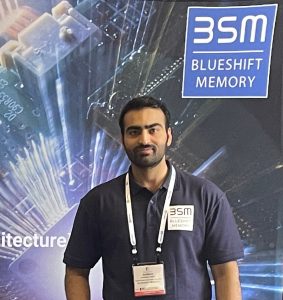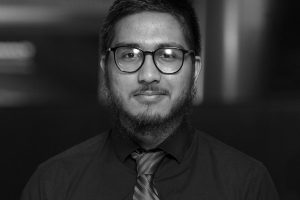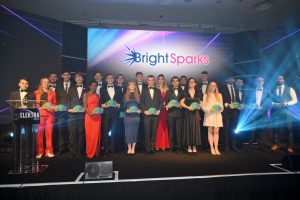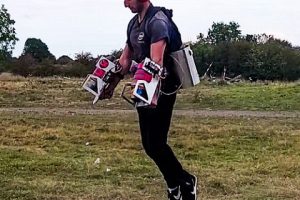Here, in our series on the latest EW BrightSparks of 2023, we profile Sarmad Adeel, a Senior Embedded Design Engineer at Blueshift Memory.
Achievements
When Sarmad joined Blueshift Memory in January 2023 it was a small start-up that was six months into a 13-month Innovate UK Smart grant-funded R&D project, his manager told us.
The project involved very demanding leading-edge research, requiring true ‘out of the box’ thinking and problem-solving – talents that Sarmad demonstrated very ably right from the start. Once he had joined the team work progressed rapidly towards a successful conclusion within the timescale and under budget.
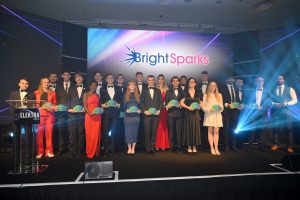 The project achieved groundbreaking results in accelerating AI calculations by up to 128x, using significantly less energy, by modifying the RISC-V CPU instruction set and managing the data structure in the memory to demonstrate the benefits of Blueshift Memory’s innovative non-Von Neumann architecture.
The project achieved groundbreaking results in accelerating AI calculations by up to 128x, using significantly less energy, by modifying the RISC-V CPU instruction set and managing the data structure in the memory to demonstrate the benefits of Blueshift Memory’s innovative non-Von Neumann architecture.
Sarmad began to make a valuable contribution immediately, we learned, working long hours to help ensure the project ran to schedule. Having been recruited for his skills in FPGAs (Verilog and VHDL) and his RISC-V design experience, he also took on responsibility for creating a YOLO 5 model in ONNX running in a Linux environment – a task that had already proved a stumbling block for others. The YOLO model was used for real-time computer vision detection applications within the ONNX AI environment.
When the opportunity arose to submit a paper for the peer-reviewed conference associated with the Flash Memory Summit in Santa Clara – the world’s leading memory event – Sarmad wrote an abstract that was accepted, and he travelled to California in August to present the paper.
He also demonstrated considerable business acumen in his very capable representation of the company on the exhibition stand there, we were told. Blueshift Memory won an award at the Summit for ‘Most Innovative Memory Technology’, an accolade that owed much both to Sarmad’s meticulous R&D work and to his well-received presentation at the event.
Prior to moving to the UK and joining Blueshift Memory, Sarmad had studied for his Masters and PhD at Hamburg University of Technology, where he also lectured for a year to undergraduates on digital signal processing. He was lead author of five invited/peer-reviewed papers for journals, conferences and workshops, on the subject of DSP algorithms and applications for energy dispersive X-ray detectors. These included the Journal of Physics, the 2023 Denver X-ray Conference and the 10th and 11th MicroTCA Workshops for Industry and Research at DESY Hamburg.
As an undergraduate in Pakistan, Sarmad was awarded a Gold Medal for his studies at the Army Public College Of Management And Sciences (UET Taxila), where he achieved a Grade A in his BSc degree in Electrical and Electronic Engineering. During this time he also participated in events including: GIKI Innovation Summit 2014, Pak and China Expo 2015, and RCCI Innovatics 2015.
 Electronics Industry Viewpoint
Electronics Industry ViewpointGavin Woodruff, Education Manager at the IET, also shared his viewpoint on Sarmad’s entry.
“The IET is dedicated to engineering a better world and Sarmad has demonstrated this consistently throughout his career and studies,” Gavin told us.
“From making an instant impact at a start-up, reducing energy usage and accelerating AI calculations by 128x, to supporting students settling into unfamiliar environments, Sarmad has been a positive influence in the engineering community.”
Community
At Hamburg University of Technology in Germany, Sarmad was vice president of the Pakistan Student Association, where he organised a number of events to help students engage with industry and with the wider STEM community.
In this capacity he also helped students from Pakistan to settle into academic life in Germany, and as a tutor on the DSP course he was an academic mentor to undergraduates.
While studying for his Bachelor’s degree in Pakistan, Sarmad researched and presented a number of innovative designs for self-sufficient incubators for premature babies, which could be used in remote areas where there is no mains electricity. For this he was awarded a prize for the most innovative undergraduate design idea.
He was also an organising committee member for CPD for the Pakistan Engineering Council (PEC).
See also: Elektra Awards 2023 – The Winners
 Electronics Weekly Electronics Design & Components Tech News
Electronics Weekly Electronics Design & Components Tech News
